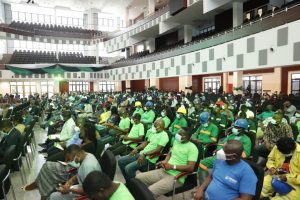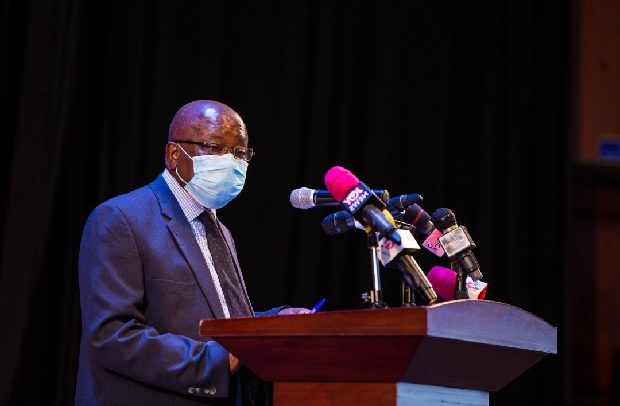Kwaku Agyeman Manu
There is a clarion need for a vibrant, resilient pests and vector control industry to be established in the country, the Health Minister, Kwaku Agyeman Manu, has strongly advocated.
This, he stressed, was very crucial, especially in the wake of the ravaging impact of Covid-19 on the country and the world at large.
“Covid-19 has taught us that as a society we need to prioritise ourselves in readiness to combat natural disasters and not adopt firefighting approaches,” the minister said.
Dr Agyeman Manu made the call when he launched the Pest and Vector Control Association of Ghana (PEVAG) yesterday in Accra.
According to him, recent happenings in the global landscape has made it imperative for the country to develop a resilient pests and vector control industry.
“In doing so, there is the need for clear policy direction and legislation to properly regulate and streamline the sector,” he said.
“My ministry is ready to work with all the stakeholders to get this done within the shortest possible time,” he firmly assured.
While praising the founders of PEVAG, the health minister indicated that it was also imperative that the pests and vector control space was sanitised by “building the capacity of players to respond appropriately and in a timely manner.”

The capacity building of players, he said, would also address the need to streamline the handling and application of chemicals used in the control of the various pests and vectors.
“Controlling vectors such as mosquitoes that transmit the malaria parasite, rats that transmit the bacteria that causes vectors to cause diseases, flies cause cholera and dysentery can be a daunting task.”
Against this backdrop, he encouraged the ministries, departments and agencies (MDAs) and the metropolitan municipal and district assemblies (MMDAs) to prioritise pests and vector as well as disinfection of public places and other high risk areas now without waiting for another pandemic to strike.
A pandemic whose effect will require several millions of Ghana cedis to fight, he added.
Again, Dr Agyeman Manu indicated that considering the hundreds of companies operating in the pests and vector control space.
The PEVAG initiative, Dr Agyeman Manu, stressed, was clearly in furtherance of government’s efforts to minimise the increase of vector-borne diseases as well as the Covid-19 pandemic and its attendant challenges.

“Over the years, there has been an overwhelming increase in pests and vectors in our major towns and cities due partly to urbanisation, rapid of course, and the associated poor sanitation.
Unfortunately, he said, efforts to curb the increase of pests and vectors and other disease pathogens have not yielded the desired results.
That, he pointed out, has contributed significantly to the spread of preventable diseases and avoidable deaths.
Again, the health minister indicated the need to regulate and standardise the pests and vector control industry, looking at the hundreds of companies already operating in this space.
The Metropolitan Chief Executive of Accra Metropolitan Assembly AMA, Mr Mohammed Nii Adjei Sowah, urged companies to take disinfection and fumigation of their premises seriously.
For his part, the Executive Chairman, Jospong Group of Companies, Dr Joseph Siaw Agyepong, noted that the Covid-19 pandemic has given them loads of experience in fighting pandemics.
To this, end, he expressed PEVAG’s readiness to help the country in fighting and preventing diseases causes by vectors and pests.
Mr Ebenezer K. Ampah Sarpong who represented the Environmental Protection Agency (EPA), was full of praise for the founders of PEVAG.
About PEVAG
The Pest and Vector control Association of Ghana (PEVAG) was formed in March 2020 and currently has over 150 member companies nationwide.
PEVAG aims to bring together the various industry players, ensure standardization, help improve their operations through capacity building, and solidify the efforts of state agencies to combat the increasing spate of pest and vector infestation in our cities.
Over the years, there has been an overwhelming increase in pests and vectors in our major towns and cities due to among others urbanisation and globalization which sometimes leads to overcrowding. This has contributed significantly to the spread of preventable diseases and deaths.
Efforts to curb the increase and spread of pests and vectors and other disease pathogens in public places have not yielded the needed results due to inadequate resources and capacity as well as the non-cooperation from stakeholders.
The emergence of the novel COVID-19 pandemic and its attendant challenges brought to the fore the need for a more concerted approach to infection prevention strategies in Ghana.
Ghana has hundreds of registered companies in the pest and vector control as well as disinfection management. Majority of these companies are in the informal sector and lack the needed capacity. Disinfection as an infection prevention strategy has been used globally to control the COVID-19 pandemic.
Considering the vital role pest and vector control (e.g. disinfection) play in disease control and prevention, there is an urgent need to regulate and standardize the operations of companies and individuals providing these essential services.
In line with the above need and to support Governments effort to minimize the increase and spread of vector-borne diseases as well as the COVID-19 pandemic and its attendant challenges, the Pest and Vector control Association of Ghana (PEVAG) was formed.


